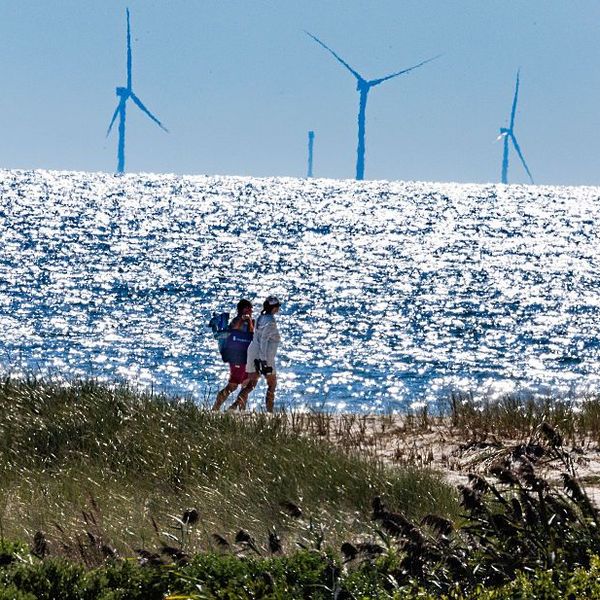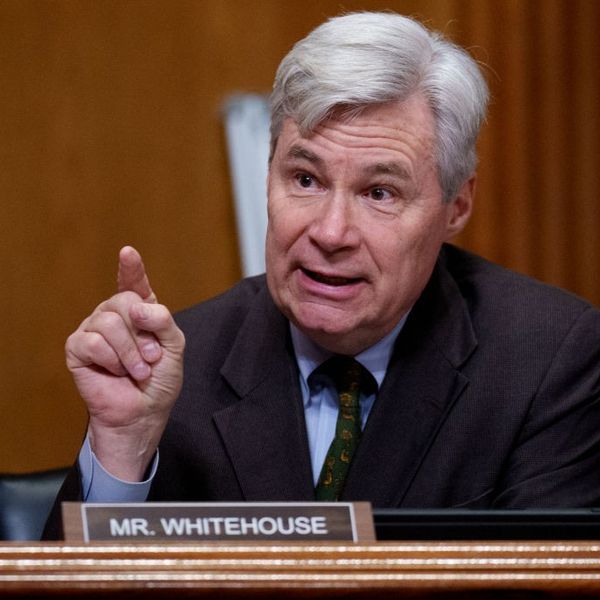'Great Day for Clean Energy' as Supreme Court Gives Renewables a Boost
SCOTUS upholds rule meant to incentivize electricity conservation and idle dirty fossil fuel power plants normally used during periods of high demand
In a decision heralded as "great news for consumers and the environment," the U.S. Supreme Court on Monday upheld a rule meant to incentivize electricity conservation and idle dirty fossil fuel power plants normally used during periods of high demand.
As Timothy Cama explains for The Hill, the court ruled (pdf) that the Federal Energy Regulatory Commission (FERC) "did not exceed the authority Congress gave it when it wrote its 'demand response' rule, mandating that electric utilities pay customers to reduce use during peak demand periods."
At the Natural Resources Defense Council blog, senior attorney Allison Clements offered further background:
In 2011, FERC (the agency that regulates our country's high voltage electric transmission grid) issued a landmark rule called Order 745, which set compensation for demand response in wholesale energy markets. Under the rule, grid operators are required to pay demand response participants the same rates for reducing energy use as those paid to power suppliers for producing energy from resources like coal, natural gas, and wind and solar power. FERC said the rule reflected the common sense view that "markets function most effectively when both supply and demand resources have appropriate opportunities to participate.''
With its ruling on Monday, the Supreme Court essentially affirmed FERC's position--and in turn, gave clean energy "a huge boost," Clements said in a press statement. That's because, she explained, "[i]f grid operators can count on fast-acting customer responses rather than plants that need more advanced notice to come online, they will have greater flexibility to meet electricity demand in situations when the sun isn't shining or the wind isn't blowing."
What's more, said Sierra Club staff attorney Casey Roberts, "demand response programs make energy cheaper, ensure the reliability of the grid, and protect our air and water from fossil fuel pollution."
As Politico points out:
The agency's win is seen as a big loss for large "baseload" power sources like coal, natural gas and nuclear in the Northeast and parts of the Midwest, which have seen their profits decline over the last several years as electricity consumption has eased and renewables grew. Now they have to compete with industrial customers and others who will at times be paid at market rates to reduce their electricity use without having the costs of operating and maintaining a power plant themselves.
"This is a great day for clean energy and the health of a more affordable, stronger power grid," added Earthjustice managing attorney of clean energy Jill Tauber on Monday. "Demand response provides tremendous benefits to our environment, helps consumers save money and makes our electricity grid more reliable."
An Urgent Message From Our Co-Founder
Dear Common Dreams reader, The U.S. is on a fast track to authoritarianism like nothing I've ever seen. Meanwhile, corporate news outlets are utterly capitulating to Trump, twisting their coverage to avoid drawing his ire while lining up to stuff cash in his pockets. That's why I believe that Common Dreams is doing the best and most consequential reporting that we've ever done. Our small but mighty team is a progressive reporting powerhouse, covering the news every day that the corporate media never will. Our mission has always been simple: To inform. To inspire. And to ignite change for the common good. Now here's the key piece that I want all our readers to understand: None of this would be possible without your financial support. That's not just some fundraising cliche. It's the absolute and literal truth. We don't accept corporate advertising and never will. We don't have a paywall because we don't think people should be blocked from critical news based on their ability to pay. Everything we do is funded by the donations of readers like you. Will you donate now to help power the nonprofit, independent reporting of Common Dreams? Thank you for being a vital member of our community. Together, we can keep independent journalism alive when it’s needed most. - Craig Brown, Co-founder |
In a decision heralded as "great news for consumers and the environment," the U.S. Supreme Court on Monday upheld a rule meant to incentivize electricity conservation and idle dirty fossil fuel power plants normally used during periods of high demand.
As Timothy Cama explains for The Hill, the court ruled (pdf) that the Federal Energy Regulatory Commission (FERC) "did not exceed the authority Congress gave it when it wrote its 'demand response' rule, mandating that electric utilities pay customers to reduce use during peak demand periods."
At the Natural Resources Defense Council blog, senior attorney Allison Clements offered further background:
In 2011, FERC (the agency that regulates our country's high voltage electric transmission grid) issued a landmark rule called Order 745, which set compensation for demand response in wholesale energy markets. Under the rule, grid operators are required to pay demand response participants the same rates for reducing energy use as those paid to power suppliers for producing energy from resources like coal, natural gas, and wind and solar power. FERC said the rule reflected the common sense view that "markets function most effectively when both supply and demand resources have appropriate opportunities to participate.''
With its ruling on Monday, the Supreme Court essentially affirmed FERC's position--and in turn, gave clean energy "a huge boost," Clements said in a press statement. That's because, she explained, "[i]f grid operators can count on fast-acting customer responses rather than plants that need more advanced notice to come online, they will have greater flexibility to meet electricity demand in situations when the sun isn't shining or the wind isn't blowing."
What's more, said Sierra Club staff attorney Casey Roberts, "demand response programs make energy cheaper, ensure the reliability of the grid, and protect our air and water from fossil fuel pollution."
As Politico points out:
The agency's win is seen as a big loss for large "baseload" power sources like coal, natural gas and nuclear in the Northeast and parts of the Midwest, which have seen their profits decline over the last several years as electricity consumption has eased and renewables grew. Now they have to compete with industrial customers and others who will at times be paid at market rates to reduce their electricity use without having the costs of operating and maintaining a power plant themselves.
"This is a great day for clean energy and the health of a more affordable, stronger power grid," added Earthjustice managing attorney of clean energy Jill Tauber on Monday. "Demand response provides tremendous benefits to our environment, helps consumers save money and makes our electricity grid more reliable."
In a decision heralded as "great news for consumers and the environment," the U.S. Supreme Court on Monday upheld a rule meant to incentivize electricity conservation and idle dirty fossil fuel power plants normally used during periods of high demand.
As Timothy Cama explains for The Hill, the court ruled (pdf) that the Federal Energy Regulatory Commission (FERC) "did not exceed the authority Congress gave it when it wrote its 'demand response' rule, mandating that electric utilities pay customers to reduce use during peak demand periods."
At the Natural Resources Defense Council blog, senior attorney Allison Clements offered further background:
In 2011, FERC (the agency that regulates our country's high voltage electric transmission grid) issued a landmark rule called Order 745, which set compensation for demand response in wholesale energy markets. Under the rule, grid operators are required to pay demand response participants the same rates for reducing energy use as those paid to power suppliers for producing energy from resources like coal, natural gas, and wind and solar power. FERC said the rule reflected the common sense view that "markets function most effectively when both supply and demand resources have appropriate opportunities to participate.''
With its ruling on Monday, the Supreme Court essentially affirmed FERC's position--and in turn, gave clean energy "a huge boost," Clements said in a press statement. That's because, she explained, "[i]f grid operators can count on fast-acting customer responses rather than plants that need more advanced notice to come online, they will have greater flexibility to meet electricity demand in situations when the sun isn't shining or the wind isn't blowing."
What's more, said Sierra Club staff attorney Casey Roberts, "demand response programs make energy cheaper, ensure the reliability of the grid, and protect our air and water from fossil fuel pollution."
As Politico points out:
The agency's win is seen as a big loss for large "baseload" power sources like coal, natural gas and nuclear in the Northeast and parts of the Midwest, which have seen their profits decline over the last several years as electricity consumption has eased and renewables grew. Now they have to compete with industrial customers and others who will at times be paid at market rates to reduce their electricity use without having the costs of operating and maintaining a power plant themselves.
"This is a great day for clean energy and the health of a more affordable, stronger power grid," added Earthjustice managing attorney of clean energy Jill Tauber on Monday. "Demand response provides tremendous benefits to our environment, helps consumers save money and makes our electricity grid more reliable."

